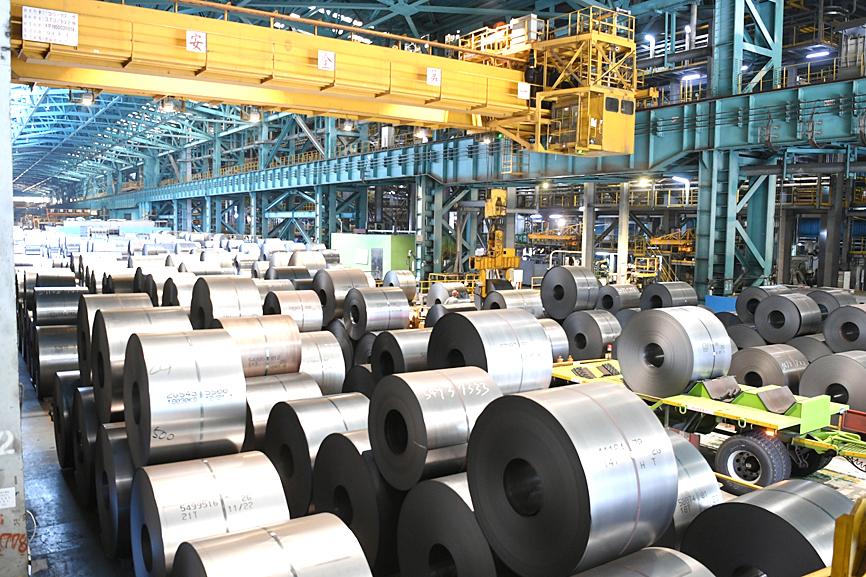China Steel Corp (CSC, 中鋼), the nation’s largest steelmaker, yesterday said it would lower domestic steel prices by 3.32 percent on average for delivery next month, as imports from China and Russia have been trading lower than market prices, depressing demand for local steel.
The price cut, the fourth monthly reduction in a row, also reflects weak demand from customers that are trying to deplete excessive inventories, the Kaohsiung-based company said in a statement.
The reduction is milder than the 5.61 percent cut for shipments this month, which CSC said points to more signs of a global recovery.

Photo courtesy of China Steel Corp
“The price cut aims to dispel market speculation [about a deeper downward revision] and better reflect market conditions,” CSC said. “The company expects a turnaround in September and is prepared for the traditional high season to arrive in the fourth quarter.”
With a weakening global economy and extreme weather events significantly curtailing demand for high-priced commodities — slowing steel inventory digestion — major steelmakers in the US, Europe and China are reducing output by suspending operations at some furnaces for maintenance, CSC said, adding that this would help mitigate a supply glut and bring forward the low point for steel prices.
Chinese steelmakers such as Baowu Steel Group Group Ltd (寶武鋼鐵) and Angang Steel Co (鞍山鋼鐵) are seeking a price rebound as Beijing is to inject 7.2 trillion yuan (US$1.06 trillion) into infrastructure construction projects to boost economic growth, CSC said.
Moreover, European steelmakers might raise prices to reflect rising electricity rates and energy costs, while US steelmaker Nucor Corp has hiked the price of thin steel sheets, it said.
The latest price trends “indicate that the global steel industry is seeing a price rebound from the dip,” it said.
The latest price adjustments would lower prices of hot-rolled steel plates and coils by NT$1,000 per tonne and cold-rolled coils by NT$1,200 per tonne, the company said.
Prices of galvanized steel coils used in anti-fingerprint sheets and those for construction would both fall NT$1,000 per tonne, the company said.
Prices of hot-dipped, zinc-galvanized steel coils used in construction and enameled steel, and those used in home appliances and computers would fall by NT$1,000 per tonne, while prices for electrical steel roll would drop by NT$1,200 per tonne, it added.

A proposed 100 percent tariff on chip imports announced by US President Donald Trump could shift more of Taiwan’s semiconductor production overseas, a Taiwan Institute of Economic Research (TIER) researcher said yesterday. Trump’s tariff policy will accelerate the global semiconductor industry’s pace to establish roots in the US, leading to higher supply chain costs and ultimately raising prices of consumer electronics and creating uncertainty for future market demand, Arisa Liu (劉佩真) at the institute’s Taiwan Industry Economics Database said in a telephone interview. Trump’s move signals his intention to "restore the glory of the US semiconductor industry," Liu noted, saying that

On Ireland’s blustery western seaboard, researchers are gleefully flying giant kites — not for fun, but in the hope of generating renewable electricity and sparking a “revolution” in wind energy. “We use a kite to capture the wind and a generator at the bottom of it that captures the power,” said Padraic Doherty of Kitepower, the Dutch firm behind the venture. At its test site in operation since September 2023 near the small town of Bangor Erris, the team transports the vast 60-square-meter kite from a hangar across the lunar-like bogland to a generator. The kite is then attached by a

Foxconn Technology Co (鴻準精密), a metal casing supplier owned by Hon Hai Precision Industry Co (鴻海精密), yesterday announced plans to invest US$1 billion in the US over the next decade as part of its business transformation strategy. The Apple Inc supplier said in a statement that its board approved the investment on Thursday, as part of a transformation strategy focused on precision mold development, smart manufacturing, robotics and advanced automation. The strategy would have a strong emphasis on artificial intelligence (AI), the company added. The company said it aims to build a flexible, intelligent production ecosystem to boost competitiveness and sustainability. Foxconn

Leading Taiwanese bicycle brands Giant Manufacturing Co (巨大機械) and Merida Industry Co (美利達工業) on Sunday said that they have adopted measures to mitigate the impact of the tariff policies of US President Donald Trump’s administration. The US announced at the beginning of this month that it would impose a 20 percent tariff on imported goods made in Taiwan, effective on Thursday last week. The tariff would be added to other pre-existing most-favored-nation duties and industry-specific trade remedy levy, which would bring the overall tariff on Taiwan-made bicycles to between 25.5 percent and 31 percent. However, Giant did not seem too perturbed by the